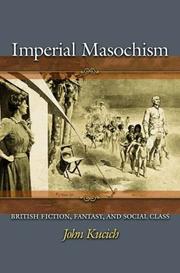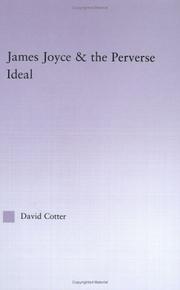| Listing 1 - 4 of 4 |
Sort by
|
Book
ISBN: 1612495184 1612495176 9781612495187 9781612495170 9781557537942 1557537941 Year: 2017 Publisher: West Lafayette, Indiana Purdue University Press
Abstract | Keywords | Export | Availability | Bookmark
 Loading...
Loading...Choose an application
- Reference Manager
- EndNote
- RefWorks (Direct export to RefWorks)
Masochism in literature. --- Alas, Leopoldo, --- Masochism in literature

ISBN: 9780691127125 0691127123 9786612129681 1282129686 140082740X 9781400827404 9781282129689 Year: 2009 Publisher: Princeton, NJ
Abstract | Keywords | Export | Availability | Bookmark
 Loading...
Loading...Choose an application
- Reference Manager
- EndNote
- RefWorks (Direct export to RefWorks)
British imperialism's favorite literary narrative might seem to be conquest. But real British conquests also generated a surprising cultural obsession with suffering, sacrifice, defeat, and melancholia. "There was," writes John Kucich, "seemingly a different crucifixion scene marking the historical gateway to each colonial theater." In Imperial Masochism, Kucich reveals the central role masochistic forms of voluntary suffering played in late-nineteenth-century British thinking about imperial politics and class identity. Placing the colonial writers Robert Louis Stevenson, Olive Schreiner, Rudyard Kipling, and Joseph Conrad in their cultural context, Kucich shows how the ideological and psychological dynamics of empire, particularly its reorganization of class identities at the colonial periphery, depended on figurations of masochism. Drawing on recent psychoanalytic theory to define masochism in terms of narcissistic fantasies of omnipotence rather than sexual perversion, the book illuminates how masochism mediates political thought of many different kinds, not simply those that represent the social order as an opposition of mastery and submission, or an eroticized drama of power differentials. Masochism was a powerful psychosocial language that enabled colonial writers to articulate judgments about imperialism and class. The first full-length study of masochism in British colonial fiction, Imperial Masochism puts forth new readings of this literature and shows the continued relevance of psychoanalysis to historicist studies of literature and culture.
English fiction --- Masochism in literature. --- Social classes in literature. --- Imperialism in literature. --- History and criticism. --- Great Britain --- Colonies --- History --- Imperialism in literature --- Masochism in literature --- Social classes in literature --- History and criticism

ISBN: 041586139X 0203957687 1136711481 113671149X 9781136711480 9780203957684 0415967864 9780415967860 9781136711442 9780415861397 1299811833 Year: 2003 Volume: v. 29 Publisher: New York ; London : Routledge,
Abstract | Keywords | Export | Availability | Bookmark
 Loading...
Loading...Choose an application
- Reference Manager
- EndNote
- RefWorks (Direct export to RefWorks)
First Published in 2003. Routledge is an imprint of Taylor & Francis, an informa company.
Psychological fiction, English --- Masochism in literature. --- History and criticism. --- Joyce, James, --- Joyce, James Augustine Aloysius --- Joyce, James --- Dzhoĭs, Dzheĭms Avgustin Aloiziĭ --- Džoiss, Džeimss --- Gʻois, Gʻaims --- Joyce, Giacomo --- Jūyis, Jīms --- Tzoys, Tzaiēms --- Tzoys, Tzeēms --- Джойс, Джеймс --- Джойс, Джеймс Августин Алоїсуїс --- Zhoĭs, Zheĭms --- ג׳ויס, ג׳ײמס, --- ג׳ויס, ג׳יימס, --- ジョイス --- ジェームスジョイス, --- Knowledge --- Psychology.

ISBN: 150171774X 9781501717741 0801434343 9780801434341 0801484502 9780801484506 Year: 2018 Publisher: Ithaca, NY
Abstract | Keywords | Export | Availability | Bookmark
 Loading...
Loading...Choose an application
- Reference Manager
- EndNote
- RefWorks (Direct export to RefWorks)
When Heinrich Heine left his sick bed in 1848 and stumbled to the Louvre to fall before a statue of the goddess of beauty and lie in the pitying, cold glance she seemed to cast on his prostrate body, he defined a recurring motif of the second half of the nineteenth century, according to Suzanne R. Stewart. Directing her attention to the voice of the shriveled male body at beauty's feet, she investigates the discourse by and about men that took hold in the German-speaking world between 1870 and 1940 and that articulated masculinity as and through its own marginalization. Male masochism, she suggests, was a rhetorical strategy through which men asserted their cultural and political authority paradoxically by embracing the notion that they were (and always had been) wounded and suffering. Stewart demonstrates and develops her contentions through close readings of the work of Leopold von Sacher-Masoch, Richard Wagner, and Sigmund Freud, in each case showing that the very act through which men sacrificed themselves to women comprised the essence of the new male subject "deeply penetrated by relations of political and sexual power." Masochistic scenarios, whether in literature, music, the visual arts, or medicalized diagnoses of the fin-de-siècle malaise, stage the male as one who submits, as Stewart explains, "to an aestheticized and eroticized gaze and voice."
Sex in opera. --- Masochism in literature. --- Sexual dominance and submission. --- Masochism. --- Sexuality in opera --- Opera --- D & S (Sexual behavior) --- D and S (Sexual behavior) --- D/s (Sexual behavior) --- Dominance and submission (Sexual behavior) --- Domination and submission (Sexual behavior) --- Sexual domination and submission --- Submission and dominance (Sexual behavior) --- Dominance (Psychology) --- Sex (Psychology) --- Sadomasochism --- Psychic masochism --- Paraphilias --- Personality disorders --- Suffering
| Listing 1 - 4 of 4 |
Sort by
|

 Search
Search Feedback
Feedback About UniCat
About UniCat  Help
Help News
News